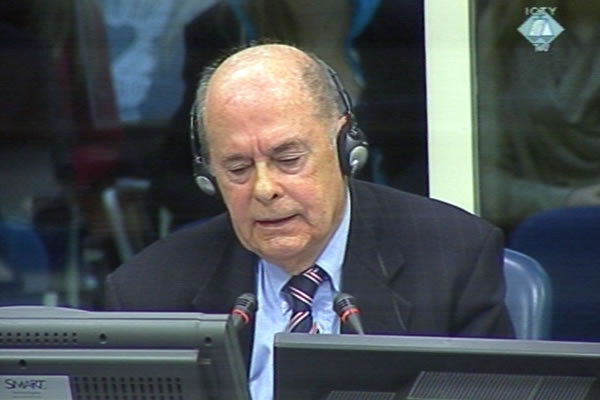Home
A WITNESS FOR ALL SEASONS
In his testimony before the Tribunal in the defense of Slobodan Milosevic, former Serbian foreign minister Vladislav Jovanovic blamed the Bosnian Serb leadership for the shelling of Sarajevo and the ethnic cleansing in BH. Today Jovanovic was forced to modify his previous claims to suit the needs of Radovan Karadzic’s defense
 Vladislav Jovanovic, defence witness of Radovan Karadzic
Vladislav Jovanovic, defence witness of Radovan Karadzic Former Serbian and FRY foreign minister Vladislav Jovanovic has not changed his opinions at all since the break-up of Yugoslavia and the wars that followed in the early 1990s. As he testified today, Jovanovic claimed that the CIA, the Vatican, Germany and the entire international community were responsible for everything. They ‘published an obituary’ for Yugoslavia and paved the way for the independence of the republics riding roughshod over the Serbs’ right to self-determination. In Jovanovic’s view, this led to the conflict in which a propaganda war was waged against the Serb side. The goal was to achieve the imposition of the sanctions and to provoke an international military intervention against the Serbs.
In his evidence in Radovan Karadzic’s defense, Jovanovic said that the story of a Greater Serbia was a ‘propaganda fabrication’: nobody wanted to have a greater Serbia. Moreover, Jovanovic claimed that the relations between the Serbian and Republika Srpska leaderships were not cordial at all. Their representatives, Milosevic and Karadzic, were ‘in a marriage of convenience’. Ideologically and politically, they were poles apart, Jovanovic said. According to Jovanovic, the main difference between them was that Karadzic ‘was more liberal and pushed for democratization, no holds barred’. Milosevic also wanted democracy, but had ‘some caveats’.
As regards the shelling of Sarajevo, Jovanovic claimed that he was convinced the Bosnian Serbs were innocent. The major incidents – such as the attack on the bread queue in Vase Miskina Street and the two Markale massacres – were staged, as part of the ‘propaganda war’, Jovanovic argued. Jovanovic used rather vague references to corroborate his claims: he said that the UN Secretary General Boutros Boutros Ghali once told the French president that Serbs were not responsible for the shelling in Vase Miskina Street; the UN Secretary General’s special envoy Yasushi Akashi repeated this claim in an interview for ‘a German newspaper’. Jovanovic also said that the Bosnian Serbs were not responsible for the ethnic cleansing in BH, explaining that the movement of the people from all ethnic communities was a ‘natural consequence of the war’.
Prosecutor Tieger reminded Jovanovic in the cross-examination that in his evidence in the defense of Slobodan Milosevic in 2005 he made claims that contradicted his evidence today. As he strove to defend his former president, Jovanovic had shifted the blame on the Bosnian Serb leadership, saying that they were ‘often rightly’ accused of ethnic cleansing and the authorities in Serbia condemned their behavior. Also, Jovanovic had repeatedly claimed that Milosevic and his regime condemned the shelling of Sarajevo ‘urging Republika Srpska to stop the operations’. A ‘terrible crime’ was committed in Srebrenica: it was deplorable that the Serbs took part in it, Jovanovic said at Milosevic’s trial.
Now, as Jovanovic testified in Karadzic’s defense, he had to modify a bit the accusations he had levied at Karadzic. Jovanovic stood by his evidence in the Milosevic case but claimed that Karadzic and his people would always say that ‘irresponsible groups and individuals’ were shelling Sarajevo; Jovanovic did suspect that the Bosnian Serbs were to blame. The Bosnian Serb leadership also told Jovanovic there was no ethnic cleansing: just the ‘natural fear of war and the desire of the people to go to the territory where their compatriots were in the majority’.
The prosecutor contested the claim that the Greater Serbia aspirations were just a ‘spin’ by quoting Karadzic, FRY president Dobrica Cosic and Jovanovic himself. In his speeches, Karadzic said that his leadership wanted to achieve the ‘unification with Serbia’. In January 1993 President Cosic advocated the implementation of that goal ‘step by step’. Jovanovic spoke about the ‘first phase’ of the realization of the unification dream. Confronted with these quotes, the witness said it was ‘natural for every nation to strive for unification’ but that everybody knew that it was not realistic at that time. Jovanovic admitted that ‘Karadzic may have uttered’ some statements that were rather harsh ‘in the heat of the struggle’. As a writer, Cosic sometimes ‘interpreted more liberally’ the positions taken by the state leadership, Jovanovic explained.
Vladislav Jovanovic will complete his evidence tomorrow.
Linked Reports
- Case : Karadzic
- 2013-02-21 ONE-EYED INVESTIGATIVE JOURNALISM
- 2013-02-20 SAFE CONDUCT FOR BOZIDAR VUCUREVIC
- 2013-02-20 BIRMINGHAM ‘CLOSER’ TO SREBRENICA THAN ZVORNIK
- 2013-02-27 ‘IMPLAUSIBLE’ AND ‘LESS IMPLAUSIBLE’ SREBRENICA ALLEGATIONS
- 2013-02-28 PRESIDENT DEFENDING PRESIDENT
- 2013-03-01 MOMIR BULATOVIC AND ‘TIME OF MADMEN’
